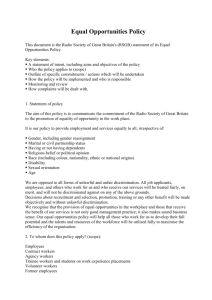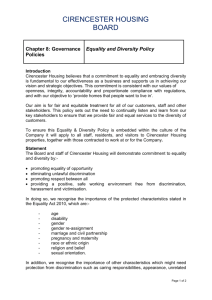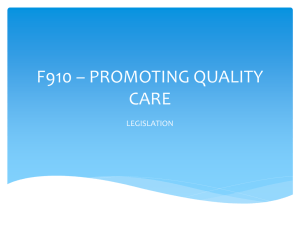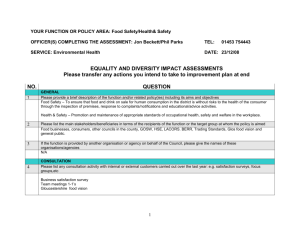Equalities policy - Plymouth City Council
advertisement
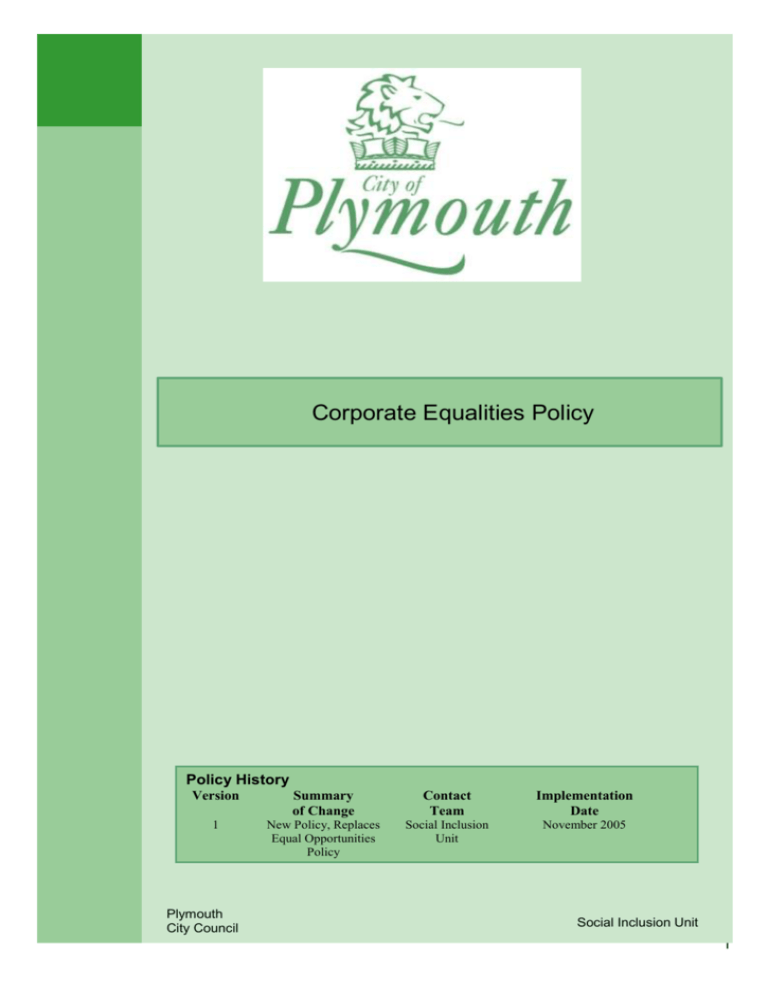
Corporate Equalities Policy Policy History Version Summary of Change Contact Team Implementation Date 1 New Policy, Replaces Equal Opportunities Policy Social Inclusion Unit November 2005 Plymouth City Council Social Inclusion Unit 1 1. Our Vision for Equalities 1.1. Plymouth City Council is committed to valuing, promoting and celebrating equality, diversity and community cohesion in order to ensure that our residents, employees and visitors enjoy an outstanding quality of life. We are committed to ensuring that people in our multi-cultural city have equal access to high quality services and the right to live, learn and work, free from unlawful discrimination. 1.2. Our commitment to equalities applies to everything we do in the council and with our citizens. It is at the core of our work with partners to make Plymouth a vibrant waterfront city of the world. 2. Commitments 2.1. We are committed to providing fair and equal access to our services and employment, to meeting our statutory obligations under equalities legislation 1, and to continuous improvement against the Equality Standard for Local Government. 2.2. We adopted the McPherson definition 2 of institutional racism in 2000 and believe that this applies to all forms of unlawful discrimination including the six equality strands of age, race, sexual orientation, disability, gender, faith and belief. 2.3. No person or group whether accessing services, applying for a job, or through employment, will be treated unfairly by the council because of their: Age Colour Disability Employment status Ethnic or national origin Faith, religion or belief (or non religion/belief) Gender or gender identity Marital status Nationality Political affiliation. Race Responsibility for dependants Sexual orientation Trade union affiliation 2.4. We will actively use our community leadership role to promote equality and community cohesion, celebrate diversity and promote good relations between people of different backgrounds and abilities. 2.5. By working in partnership with a range of other organisations, individuals and communities we will work towards eliminating unlawful discrimination (including harassment and victimisation) and prevent any adverse impact on our customers and wider communities. 3. Scope and Responsibilities 3.1. All council employees have a vital role in promoting equality and tackling unlawful discrimination. 1 See Appendix A Institutional Racism is “ The collective failure of an organisation to provide an appropriate and professional service to people because of their colour, culture or ethnic origin. It can be seen or detected in processes, attitudes and behaviour which amount to discrimination through unwitting prejudice, ignorance, thoughtlessness and racist stereotyping which disadvantage minority ethnic people.” (Stephen Lawrence Enquiry) 2 2 3.2. Employees are expected to: Engage with and understand the diverse needs of the communities they serve in line with their job specifications Treat people with respect and promote equality in their work Take up learning and development opportunities on the full range of equality strands Take personal responsibility to keep their behaviour and actions within this policy Address inappropriate service delivery or behaviour though the channels provided Be fully aware of policies and guidelines relating to equalities. 3.3. Managers will, in addition: Provide and promote learning and development opportunities on the full range of equality strands Challenge oppressive and unhelpful cultures and traditions Ensure that workers understand and uphold this policy Promote and celebrate best practice Ensure service delivery is underpinned by this policy 3.4. The council management team will, in particular: Lead and drive all employees’ work in relation to this policy and associated plans 3 Ensure that all council work is delivered within the equality requirements Monitor and evaluate their own performance Identify and provide resources (eg budgets, staffing, representation on working groups) corporately and departmentally to deliver effectively in relation to equality Continuously promote equality across the whole Council and in all policies and procedures Audit and scrutinise equality activity in relation to national standards and performance indicators. 3.5. Elected members set the equality policy for the council and provide leadership and support in decision-making about equality matters. They will review this policy for continuous progress though their performance management and scrutiny functions. A member of the cabinet will be appointed as portfolio holder with responsibility to champion equalities. 3.6. Customers from the community will be involved with the equality planning process and participate in scrutiny. Customers will be treated with respect and the same will be expected in return. 4 Objectives 4.1. By implementing this policy, the council will aim to make: Services reflect equalities requirements Certain there is fair and equal access to, and information about, our services Recruitment and employment practices transparent and fair Equality and diversity an integrated part of all council activity including strategic planning, performance management and business practices Sure that there is no place for unlawful discrimination against or by our customers Innovation and sharing of best practice about equalities key to our further development. 5 Implementation 5.1. We will identify and make resources available to support the effective implementation of this policy, as part of our service planning. 5.2. The full implementation of this policy will be supported through the development of our Corporate Equality Plan, and be achieved by a thorough and timetabled action plan. All services and their employees have a role to play in developing and implementing this to produce positive outcomes. 3 Includes Corporate Equality Plan; Race Equality Scheme and within all service plans. 3 5.3. The importance of this policy and the Corporate Equality Plan will be promoted by ensuring that we publish them and make them widely available and understood 5.4. We will assess the impact of our work on equalities, monitor and evaluate outcomes, take learning and development opportunities and use corporate and employee performance management processes to eliminate unlawful discrimination and develop good practice in equalities. 6 Employment Practices and People Strategy 6.1. We value the diversity of our employees and customers and want our workforce to be representative of the community it serves. 6.2. Our employment practices will be fair, transparent, and free from unlawful discrimination. To help achieve this, we will monitor: Vacancies and recruitment Grievance processes Harassment processes Complaints Disciplinary action Promotions, and secondments Leaving the council Learning and development programmes. 6.3. We are committed to fair employment, equal pay practices and flexible working and will ensure that: Vacancies are advertised using ways that are fair and accessible to all sections of the community seeking employment, in particular those identified as under-represented Skills specified for jobs will be strictly relevant to the requirements of the job Entry requirements will be clearly and objectively stated, and reflect the principal functions of the post Interviewers will be trained to ensure that the process is undertaken in a fair and consistent way and within this policy and equality legislation (see Appendix A) At least one member of each interview panels has a robust understanding of equal opportunities Employees are inducted into the values and policies of the Council regarding equalities. 6.4. Employees who believe that they have suffered unfair treatment and or unlawful discrimination will have their concerns taken seriously and be given advice regarding the agreed procedures and support which may be available. 6.5. Close liaison with trade union representatives will assist in making this policy effective. 6.6. The Human Resources service has corporate lead responsibility for monitoring, researching and promoting equal opportunities in employment, using methods like anti-discrimination, best practice and providing monitoring reports to enable implementation of this policy to be regularly reviewed 7. Learning and Development 7.1. Learning and development has a key role to play in building a foundation for equality practices We recognise that employees have varying needs and a comprehensive training and learning programme will, over time, be developed linked to our employee appraisal process. 7.2. We will monitor access to learning and gather, and act on, employees’ feedback about the effectiveness of the opportunities offered and attended. Any resulting action will aim to ensure that opportunities remain useful and relevant to the needs of employees and service delivery. 4 8. Access to Information and Services 8.1. We will monitor our information and services in relation to this policy and remove any identified barriers to access and information eg by providing translators and interpreters to ensure that our services remain responsive to people’s needs. 8.2. A systematic process for conducting equality impact assessments and getting feedback about the experience of our diverse customers when receiving (or not receiving) services will be developed. 9. Service Delivery (including contracting, monitoring and planning) 9.1. Our Corporate Equality Plan will help ensure that service delivery is effective and proportionate and meets the standards of this policy. We are committed to monitoring consultation findings, service use, target setting, and acting on the findings. 9.2. Organisations working with us to provide services to the public will need to demonstrate their understanding of, commitment to and compliance with equalities legislation. We will develop process aimed at consistently stipulating this in all contracts and service level agreements. 9.3. We will work with other organisations delivering services to promote equalities and assist marginalised communities, agencies, groups or individuals in order to maximise their capacity, empowerment and development. 9.4. We will ensure: Progress monitoring in relation to equalities within service delivery Audit and scrutiny using performance indicators Training for employees in commissioning, contracting and procurement work to make equalities part of their business On going recording and monitoring of incidents reported as discriminatory. 10. Consultation and Publishing information 10.1. We will make consultation with our customers active and genuine involving a range of people and methods that reflect our local communities 10.2. We will also provide: Clear and accessible information about our services in a variety of formats on request, for example in large print, audio tape, Braille, on computer disc and in appropriate languages Interpreters or translators in other languages including British Sign Language as needed Type Talk and hearing loops in our offices where possible 10.3. Information and activities relating to equalities will be published on the council’s web site. 11. Working with Partners and Stakeholders 11.1. We will make genuine partnerships and have meaningful dialogue with a wide-range of diverse partners and stakeholders to help promote corporate priorities and the City Strategy. We will also work with the Local Strategic Partnership to promote equalities. 12. Compliments, complaints and representations 12.1. We positively welcome feedback from stakeholders on all aspects of our work. Customers, and those not currently using our services, who believe that they have suffered unfair treatment or unlawful discrimination will have their concerns taken seriously through our complaints procedure “Have your Say”. This also takes specific account of racist and homophobic incidents recording and 5 appropriate confidentiality requirements. 13. Review 13.1. We will evaluate our policies, procedures and practices through a rolling equality impact assessment process to ensure that they encourage and support our determination to promote equality and eliminate unlawful discrimination. 13.2. An annual report will be presented to the portfolio holder for equalities outlining progress against this policy. 13.3. This policy will be reviewed annually and in the light of progress with equalities, any changes in the law, and other aspects of equalities, and proposals for changes made as necessary. 6 APPENDIX A - Legislation The council will fulfil codes of practice requirements and our statutory duties4 to meet the: Human Rights Act 1998 Disability Discrimination Act 1995 Disability Discrimination Act 1995 (Amendment) 2003 Disability Discrimination Act 2005 Sex Discrimination Act 1975 Race Relations (Amendment) Act 2000 Race Relations 1976 (Amendment) Act 2003 Equal Pay Act 1970 Employment Equality (Religion or Belief) Regulations 2003. Employment Equality (Sexual Orientation) Regulations 2003 EC Code of Practice on the protection of the dignity of men and women at work (Directive 92/131/ECC) Employment Equality Act 1998 Data Protection Act 1998 (This is not an exhaustive list and the Council will meet its duties and requirements in relation to all relevant legislation) 4 Further information from the Social Inclusion Unit and Plymouth City Council Legal department. 7 APPENDIX B- Definitions Community Cohesion5. - A cohesive community is one where: There is a common vision and a sense of belonging for all communities The diversity of people’s different background and circumstance is appreciated and positively valued Those from different backgrounds have similar life opportunities Strong and positive relationships are developed between people from different backgrounds in the workplace, in schools and within neighbourhoods. Discrimination6 - Any situation in which a group or individual is treated unfavourably based on prejudice, usually against their membership of a socially distinct group or category. Such categories include race, gender, sexual orientation, religion or belief age, and disability, or any personal characteristic of an individual. It may be directed at one person or many people. Discrimination applying to the equal availability of employment opportunities, housing, and goods and services is widely legislated against. Harassment - Harassment includes any unwanted conduct that has the effect of violating dignity or creating an intimidating, hostile, degrading, humiliating or offensive environment, for men or women and may amount to unlawful discrimination. Harassment can relate to age, sex, race, disability, religion or belief/non-belief, sexual orientation or any personal characteristic of an individual. It may be directed at one person or many people. It can be behaviour over a period of time, but a serious one-off act,may also amount to harassment. Victimisation - Individuals who suffer unfavourable treatment because they have in good faith taken part in a "protected activity" under one of the unlawful discrimination Acts. An example is giving evidence in connection with an unlawful discrimination claim brought by another person. It can also apply to where a relationship has ended, where the relationship can be referred to as a period of employment. Equal Opportunities - This is an ongoing process to give everyone a fair chance to fulfil his or her potential and is backed up by various legislation. Stakeholders - This refers to groups or individuals who are affected by provision of services and will generally offer different perspectives on policy or delivery issues according to whether they are involved as users or citizens. This means that a longer term or broader view on a particular issue can be given, whereas the views of users of particular services or those who are affected by policies are likely to be shaped by their direct experience of them. Partnership - This is defined as working with organisations that already have relationships with, and experience of, specific groups, and/or related interest in achieving a specific aim or common goal. Diversity - Recognises the differences that are a natural part of society, and focuses on how to harness differences between people to drive forward creativity and excellence in performance. In the workplace this means recognising individual and group differences, which means more creativity and continuous improvement. 5 6 From www.homeoffice.gov.uk Definitions of discrimination, harassment, victimisation from www.cre.gov.uk 8 Equality - This can be understood from three perspectives7: Moral – Equality is based on fairness, no one should suffer detriment on the basis of his or her external characteristics Legal - Legislation imposes a minimum standard of behaviour on service providers, employers and individuals Change – Embracing change by valuing and encouraging the diversity of employees, customers and partners. 7 Definitions of diversity and equality as detailed in Croners Reference Guide to Equalities 9





